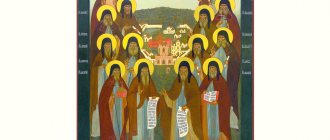Benjamin West, The Expulsion of Adam and Eve from Paradise (1791). Image from fineartamerica.com Priest Mikhail Vladimirov , rector of the Church of the Holy Life-Giving Trinity in Franklin (New York, USA) and Archpriest Alexey Emelyanov , head of the Department of Biblical Studies at PSTGU (Moscow), discuss the issue.
“Adam sinned, what do I have to do with it?”
"What did I do? - modern man is indignant. “Adam sinned, but I didn’t sin!” Why should I be held responsible for something I didn't do? Be responsible for someone's guilt? What does this have to do with me?
O. Mikhail : The easiest way to explain what Adam’s sin is is to start by talking about agriculture. For centuries, humanity has cultivated wild plants suitable for food, making them more fertile. But recently, scientists have come to the conclusion that it is much more effective and faster to simply genetically modify them. In other words, using genetic engineering to make irreparable changes to the genetic code of plants, such as corn, which, from the point of view of scientists, will improve its yield.
But compared to the original corn, genetically modified corn is damaged, regardless of whether it has lost or acquired qualities that are not characteristic of it. Such a plant will pass on these genetic changes to all subsequent generations. For example, corn genetically modified today will retain these changes hundreds of years from now.
Approximately the same irreversible changes occurred with man during the Fall. Human nature, originally created by God, acquired features that were not characteristic of it, which each of us has inherited today. In other words, during the Fall, an intact person turned into a damaged-modified person who acquired the following three properties:
- passion - on the one hand, inclination and submission to sinful desires, such as fornication, envy, theft, hatred, pride, etc., on the other hand, emotional suffering from them.
- Corruption is a person’s exposure to suffering from nature: hunger, cold, heat, fatigue, illness, etc.
- Mortality is the limitation of life in time.
The unnaturalness of these qualities for human nature is confirmed by the desire to overcome them, a desire that has existed among people at all times and in all nations. Man has always wanted to get rid of suffering, disease and achieve immortality. At the same time, each of us feels these damages within ourselves, tries to overcome them, and knows from experience the futility of these efforts.
Returning to the analogy with genetically modified plants: scientists involved in genetic engineering today are well aware that a modified plant itself will never be able to return to its original state. Just as there is no 100% certainty that scientists will be able to reverse these changes in a hundred years. Therefore, with the development of genetic engineering, the need arose to create a bank of unmodified seeds of all agricultural crops. Such a seed bank has been created and is located in the mines of the island. Spitsbergen.
The history of mankind confirms that man is not able to overcome the sinful changes he has received. But no other, “spare” man was created, from whom, like from an immaculate grain from a storehouse on Spitsbergen, a sinless man could be recreated. Therefore, the Incarnation became the divine act of restoring human nature in its nature, without the distortions received in the Fall of Adam.
Christ united in himself two natures, human and divine, restoring distorted human nature to its pristine perfection. After the Resurrection, neither death, nor corruption, nor passion are inherent in human nature, recreated in Christ.
Any person can receive the germ of integrity in the sacrament of Baptism and further develop it in himself or destroy it.
Not cruel, but adequate
Archpriest Alexey Emelyanov.
Photo from the site pstgu.ru – The first person was inexperienced, he stumbled. If God loves his creation so much, why did he punish him so harshly and for so long? Well, Adam sinned. Today they would say that he simply took the initiative to grow up! Like a child, he grows and his fingers plug into the socket. Well, he hasn’t yet learned what is good and what is bad. Age psychology, inexperience. The prodigal son did all sorts of things, but his father greeted him with joy, gave him a feast, and in Paradise they treated Adam so cruelly...”
Archpriest Alexey Emelyanov:
– Why do we even talk about what happened to Adam and Eve as a sin - that is, about some kind of erroneous choice made with the consciousness of what was happening? Because initially the concepts of good and evil, life and death were accessible to them, mysteriously announced. Adam is not a baby who did not know what he was doing, but the one who gave all the names to God’s creation, in a mysterious (for us) way penetrating into everything that exists, comprehending the essence of this creation and being able to designate it. And, breaking the commandment, in a certain sense, he knew what he was doing - otherwise his responsibility would not have been so great.
The essence of the sin of Adam and Eve is that man deliberately chose life without God, already knowing God, knowing how great and good God is.
But Adam relied on his own strength (which God gave him), and wanted to take the place of God, to become God himself. And doesn’t a person continue to make such a choice today, albeit unconsciously?
But the concepts of sin of the ancestors Adam and Eve and original sin are not identical.
The sin of the first parents is described in the first book of the Bible - Genesis. But this “event” is so multi-sense that even Christian interpretations are not one or two. Not to mention trying to see it as just an archetypal myth.
The concept of “original sin” is developed by the Apostle Paul in his letter to the Romans (5:12). He says that just as by one man sin entered the world, so death spread to all men, because in him, the first, one man (Adam) all sinned. This place has another reading when translated from Greek. Not “ because all have sinned ”, but “ because all have sinned .”
If we accept the first version of reading (it is this translation that is used in our Divine Liturgy when reading the Slavic text of the Apostle), then it is obvious that the emphasis is on the imputation of Adam’s sin to all subsequent generations, a certain “infection” of man with sin. The sin committed by Adam affects all of his descendants and determines their fallen and mortal nature.
If you read the words of Ap. Paul about Adam, “because all sinned,” then we should talk about the responsibility of each person for his personal sin, and not for Adam’s crime. Beginning with the ancestor, the sins of people are the cause of their death. Adam is the prototype of all future sinners who repeat Adam's sin and are responsible for it.
And in life all this is confirmed. I serve in a children's hospital and I see that half of the children are there because of disobedience to their parents.
Up to completely catastrophic phenomena that radically affect the rest of life. For example, a mother told her child not to go to a football match: “fans,” fights, uncontrollable crowds. He drove off, fell under the train, and both his hands were cut off. We later talked with this boy in the hospital. It’s clear that you can’t get your hands back; you’ll have to live without your hands. This is a kind of irreversibility. Therefore, the saints say that if we do not listen to someone’s good will, if we go contrary to it, then we need to blame ourselves, and not “parental sin.”
Why does Adam's fall extend to the entire human race? The Apostle Paul does not have a formal answer. And Blessed Augustine of Hippo, for example, has the following thought:
there is nothing more famous than the doctrine of original sin, but at the same time, there is nothing more mysterious and inaccessible to human understanding than this doctrine.
Character history
Eve is the foremother of all people, the wife of Adam, created by God from the rib of the first man. Mother of Cain, Abel and Seth - the first people born outside the Garden of Eden. Seduced by the serpent, she gave her husband Adam a taste of the forbidden fruit from the Tree of the Knowledge of Good and Evil, which in Christian mythology became the cause of the fall of the first people.
One third free
Rene Magritte, The Son of Man (1964), fragment.
Image from wikipedia.org Throughout the history of Christianity, there have been attempts to abandon the idea that Adam's sin harmed anyone other than himself. For example, the opponent of Blessed Augustine, Pelagius, believed that Adam’s sin damaged only Adam himself, but not the entire human race. And newborn children are in the same state as Adam was in before the Fall.
According to Pelagius, if we recognize original sin in a person, this takes away his free will to fight sin, creates predestination, and obviously plunges him into depression. Therefore, Pelagius taught that everyone is free, and, like Adam, is born in a state of such free choice. There is no “damage to human nature,” and nothing prevents a person from freely choosing or not choosing good.
And yet, the fact that a person has this contagious level of sinfulness of his being, starting from an unconscious, non-judgmental age, is more obvious. Following the ap. Paul (Rom 7: 14 - 25) we realize that often we do what we do not want, or, on the contrary, we want what we are powerless to do. And therefore, will and actions are not directly connected in us - we sin against our will. Yes, a lot depends on the conditions in which a person grows. But even the best parents have problems with their children; it is impossible to reach them, and they live completely contrary to the line that has been laid down in the family since their infancy. This is a picture of the tragic duality of humanity.
Apparently, the peculiar ambiguity of Paul’s words about original sin, which obviously allows for a double understanding simply at the grammatical level, is providential and not accidental.
This indicates that, on the one hand, human nature is undoubtedly damaged. In the age of genetics, it should be clear simply by analogy that the human composition (body and soul) could mutate and begin to carry a distorted “gene pool”, passing it on to offspring.
On the other hand, each person, like Adam, is responsible for his own actions. So healthy and wounded soldiers in positions are responsible for their actions before their conscience and military duty. And both the first and the second can behave differently. A bleeding warrior is capable of performing a feat, and an unharmed warrior can flee from the battlefield. So we too have been mutilated since the beginning of our “invisible battle” with sin, and we will have to respond as if we were able to fight.
Grace, the power of God, frees a person from sin. In God's plan, every person is “predestined” to accept it. And yet the last step in this choice is up to the person. Saint Gregory the Theologian proposed an almost mathematical formula for salvation: our salvation depends both on us and on God. But God and man are so unequal. And Saint Gregory the Theologian adds that for a person to succeed in salvation, two shares from the great God are needed: the first is the first impulse (attractive grace), and the last is the judgment and mercy of God. And in the middle is the man himself, flowing in the field, and conditionally his share in the saving work is one third, but this third remains behind him.
Evidence that the Fall involved the abuse of love
Both religion and science confirm that abuse of love in the family is the main cause of human suffering and evil. Religion teaches that a person must take a responsible approach to raising a family, and prescribes the most severe punishments for those who violate God's commandments in this area. Thus, adultery and other forms of illicit love are strictly prohibited and in many traditions are punishable by death.
Social science confirms that family is the key to a healthy society (or its opposite). The breakdown of the love relationship between a man and a woman leads to the breakdown of the family, thereby giving rise to all social problems, from alcoholism and drug addiction to teenage delinquency. Of particular concern to psychologists and sociologists is the increase in abuse of children by their immature and unloving parents. Moral decline has always been a fatal disease of all civilizations that have sunk into oblivion. The rapid decline of morality in modern secularized society has given rise to a plethora of social problems, from single-parent families and child abuse to growing numbers of homeless people and widespread mind-numbing addictions.
Medical scientists and practitioners provide additional data on the damage caused by family breakdown, in particular, on the social harm of sexually transmitted diseases, spread primarily as a result of illicit love relationships. For example, the AIDS epidemic is a direct consequence of widespread immorality in modern society and poses a threat to the lives of an increasing number of people.
The family is the foundation for creating a healthy (or sick) society and world, therefore, the final solution to the numerous problems that poison human relationships - from family conflicts and disturbances of public order to racial conflicts and wars - will appear only when in the relationship between a man and a woman, and also, true love will be reborn between parents and children.
Original sin – “Eve’s fornication with the serpent”?
Priest Mikhail Vladimirov
- There is a version that original sin is the fornication of Adam with Eve or Eve with the serpent... Perhaps this is how “folk theology” distorts the allegorical understanding of the fornication of a soul that turns out to be unfaithful to God?
O. Mikhail: It is rather strange to say that the essence of original sin lies in the fornication of Adam and Eve. Firstly, between husband and wife, in a marriage blessed by the Lord, there can be no fornication. Secondly, at the creation of man, the Lord tells Adam and Eve that they must fill the earth with their descendants. Thirdly, after the expulsion from paradise, when the first intimacy of Adam and Eve occurred, about which the biblical narrative says: “Adam knew Eve his wife,” and Eve gave birth to her firstborn, she says: “I have acquired a man from the Lord.” The birth of a child is perceived by Eve as a gift from the Lord and God's blessing.
As for the assumption that Eve sinned with the serpent, this is actually a very old heresy.
Throughout human history, people's special attention has been focused on the disaster that occurred in the Garden of Eden. But not only was human attention drawn to this, but also the attention of the serpent/Satan. The serpent wants to take credit for even greater success in destroying man.
I think that it is from his poisonous whisper that the theory of original sin is born as the copulation of the serpent with Eve, followed by the birth of Cain from this.
Typically, such fabrications are constructed by compiling lines from the Old Testament taken out of context. One example of such a compilation can be found in the American preacher William Branham. He, examining the text of the Bible, comes to the conclusion that there was a “heteropaternal superfecundation” - the rare appearance of twins from two different fathers. This means that Cain and Abel were twins, Cain was conceived from the serpent, and Abel from Adam. The Serpent would certainly like a significant part of humanity to be his children, or at least consider themselves his children.
Each of us knows very well that a child is like his parents not only when he grows up, but already from the first days of his life. It is impossible to suppose that the adult half-beast, as Cain must have been if he had been conceived by the serpent, would not have differed in appearance from his brother Abel. In the same way, it is impossible to imagine that if such a difference existed, the biblical text would be silent about it.
We can say with confidence that Cain was no different not only from Abel, but also from all future descendants of Adam and Eve. After the murder of Abel, Cain is expelled by God, and in order for everyone to distinguish him, the Lord makes a special sign for Cain (Genesis 4:15), so that if anyone meets him, he would not kill him. If he were a half-beast, then his appearance itself would indicate to all people who he was, and such a sign would not be necessary.
Another confirmation can be given that the biblical text clearly indicates that Cain cannot be the son of the serpent. Having given birth to Cain, Eve says: “I have obtained a man from the Lord” (Gen. 4:1). The name Cain itself comes from the word “kinyan” in Hebrew - “acquisition.” And if you make a literal translation from Hebrew of Eve’s entire phrase, it will sound: “I acquired a man with the help of God.” Thus, the Acquired One was acquired with the help of God - this is what the name of the firstborn and the phrase uttered by Eve mean. It's hard to imagine that this could apply to a serpent.











